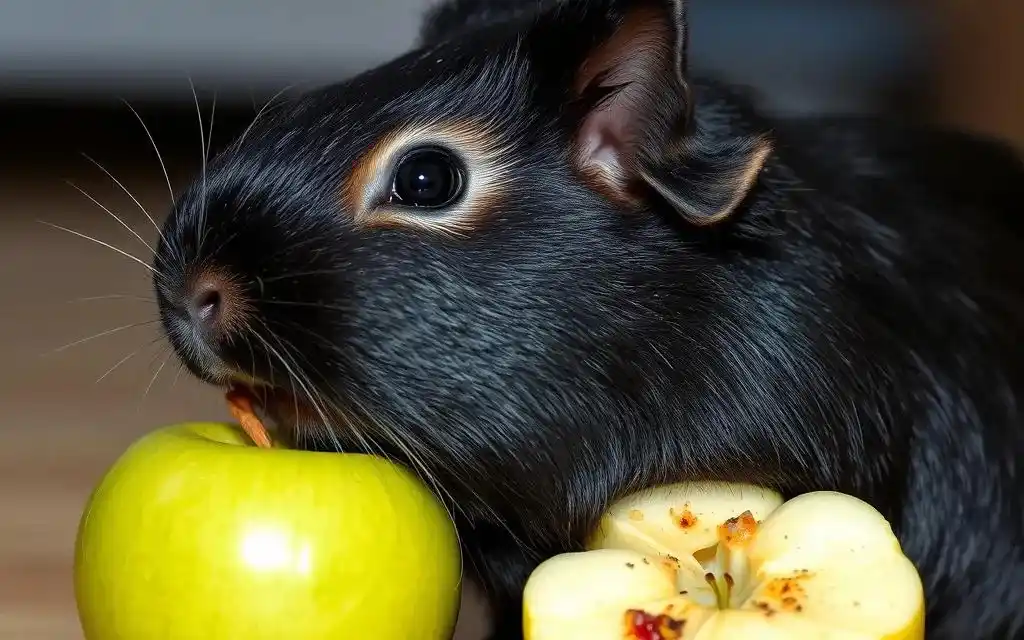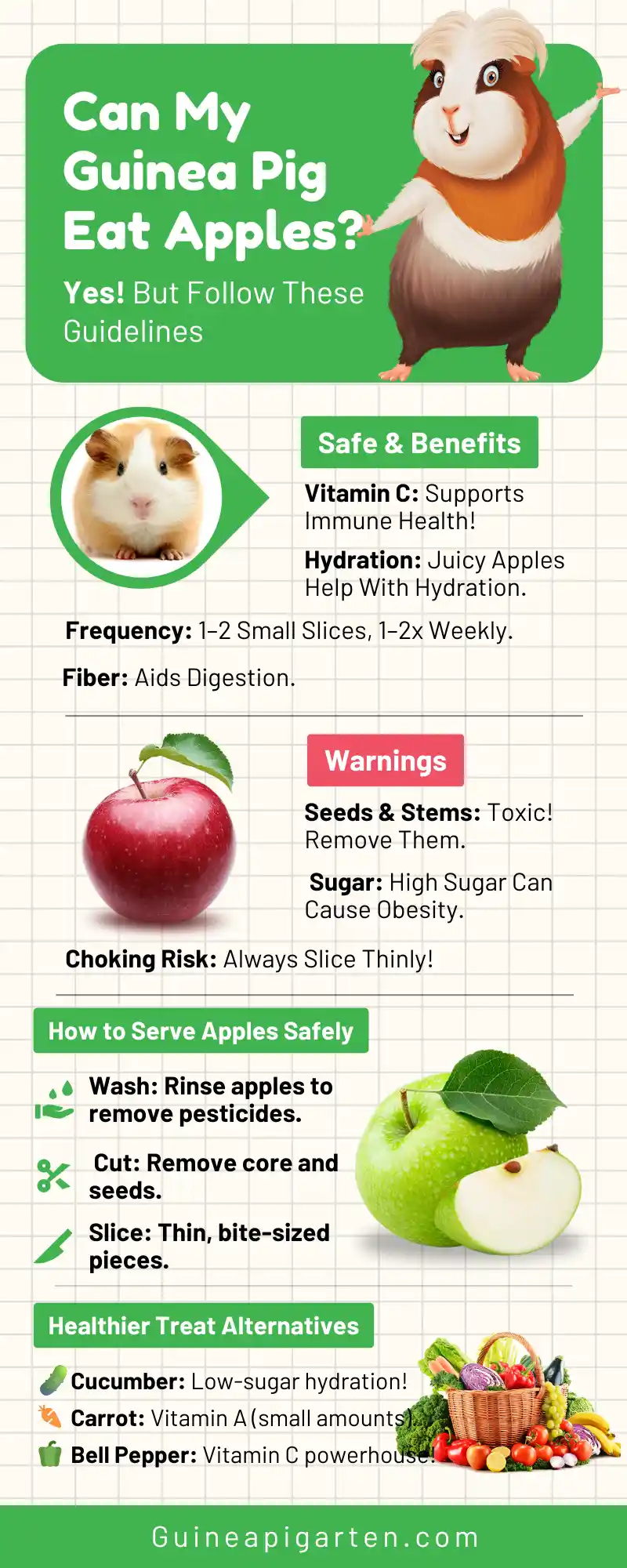As we all know, “ An apple a day keeps the doctor away”. So, whenever a guinea pig owner like me munch on a crisp apple, the first thing that comes to his/her mind is: Can guinea pigs eat apples? Even though the answer is “Yes”, there are a few important caveats. This post will reveal everything you need to know about feeding apples to your furry friends.
What are some nutritional benefits of eating apples for guinea pigs?
Proper hydration and a diet rich in fiber and vitamin C can make these little rodents thrive. Here are some nutritional benefits of having apples.

Increases vitamin C
As guinea pigs cannot produce their own vitamin C, unlike humans, so apples can boost vitamin C in these tiny pets. Per 100 g apples contain about 4.6 mg of vitamin C. Even though a guinea pig requires 10 to 30 mg of vitamin C daily, apples can help them get some.
Besides apples, you can feed your guinea pigs some other fruits and veggies that are loaded with vitamin C, such as kale or bell peppers.
Packed with fiber
To help your guinea pig with a smooth digestion process, feeding apples can be a good option as it is packed with fiber. However, issues like bloating and discomfort can be caused by too much fiber from fruit. So avoid overdoing it.
Provides hydration
Apples can keep your beloved guinea pigs hydrated for a long time, especially on warm days, with 85% water content.
What are some risks of feeding apples to your guinea pigs?
Here are some risks to watch out for before feeding apples to your favorite pet.

Overloaded with sugar
Sometimes, per 100g of apples may contain 10g of sugar, which can be harmful to the health of your guinea pigs. It can be difficult to burn off this amount of sugar by the tiny guinea pigs. Overfeeding apples can lead to digestive issues, obesity, and diabetes. So, always feed apples in moderation.
Stems and seeds
Stems of apples may increase the risk of choking, whereas consuming too many apple seeds can lead to poisoning in the stomach of your guinea pigs. Apple seeds contain amygdalin, which releases cyanide when chewed. So, always slice apples into seedless, bite-sized pieces before feeding them to the tiny pigs.
Pesticides
Always wash the apples thoroughly or peel the skin before giving them to your furry friends, as non-organic apples often carry pesticide residue.
How do you serve apples to your guinea pigs?
Follow this step-by-step guide before treating your guinea pigs with apples.
peel or wash
Peel the skin of non-organic apples before feeding them to the pigs. Scrub the apple under running water to remove chemicals and dirt.
Remove the core and seeds
Discard the seeds and core and cut the apples into thin slices.
Slice into bite-sized pieces
Your little piggy might struggle to chew too large of pieces. So, cut the apples into pieces that are not bigger than a thumbnail.
Try a test piece
Introduce apples slowly to the guinea pigs. Wait 24 hours to watch out for issues like lethargy and diarrhea.
How many apples can a guinea pig eat?
Serving size
Eating a full slice of apple is similar to eating a whole cake regularly for guinea pigs. Feeding a single thin slice twice a week is enough for the tiny rodents.
Frequency
The main diet of your guinea pigs should contain pellets (5%), hay (80%), and vegetables (15%). 1 to 2 apple servings weekly is plenty of.
What if Your Guinea Pig Overeats Apples?
Overeating apples can cause severe health issues, such as lethargy, diarrhea, and loss of appetite. Consult a veterinarian immediately if you notice any of these symptoms. Stop feeding apples further and offer only hay and water.
Other than apples what other fruits are safe for guinea pigs?
Here are some guinea pig-friendly fruits other than apples.
Strawberry and blueberries
These berries are rich in antioxidants that can be beneficial for your guinea pigs. However, offer only 1 to 2 berries weekly.
Pears
Unlike apples, pears should be eaten in moderation only after removing the seeds.
Melons
Cantaloupe and watermelon can provide complete hydration to your guinea pigs. Serve tiny cubes after removing the rinds.
Pros and cons
Here are the benefits and risks of feeding an apple to your furry friend.
| Pros | Cons |
|---|---|
| 🍎Contains vitamin C helps prevent scurvy and supplements daily needs. | 🥧 Increases the risk of digestive issues, diabetes, and obesity due to high sugar content. |
| 🐹 Rich in dietary fiber that prevents constipation and helps in proper digestion. | 🍒The seeds and stems of apples can be toxic as the seeds contain cyanide. It may also cause choking hazards. |
| 💧 85% of water content provides the necessary hydration that is great for warm days. | 🐹 As fruits are often exposed to pesticides so, chemical residue can be left over even after washing. |
| 🍏 Enrichment adds variety to the diet and boosts natural foraging. | 🍎 Over-feeding apples may cause diarrhea in your guinea pigs and thus reduce their hay consumption. |
Recap
Apples are completely safe for guinea pigs as long as you follow the rules. Apples should always be given as a treat after washing thoroughly, removing the stems and seeds, and cutting into small cubes.

Always avoid overfeeding apples or any other citrus fruit to your tiny rodent as most fruits are too acidic and high in sugar. Feeding too many fruits can lead to several health issues. If you notice any serious symptoms after feeding an apple to the little pigs, then consult a veterinarian immediately.
I hope you will be relaxed enough while feeding apples to your guinea pigs after reading this post. So, happy and safe snacking for your furry companion.

